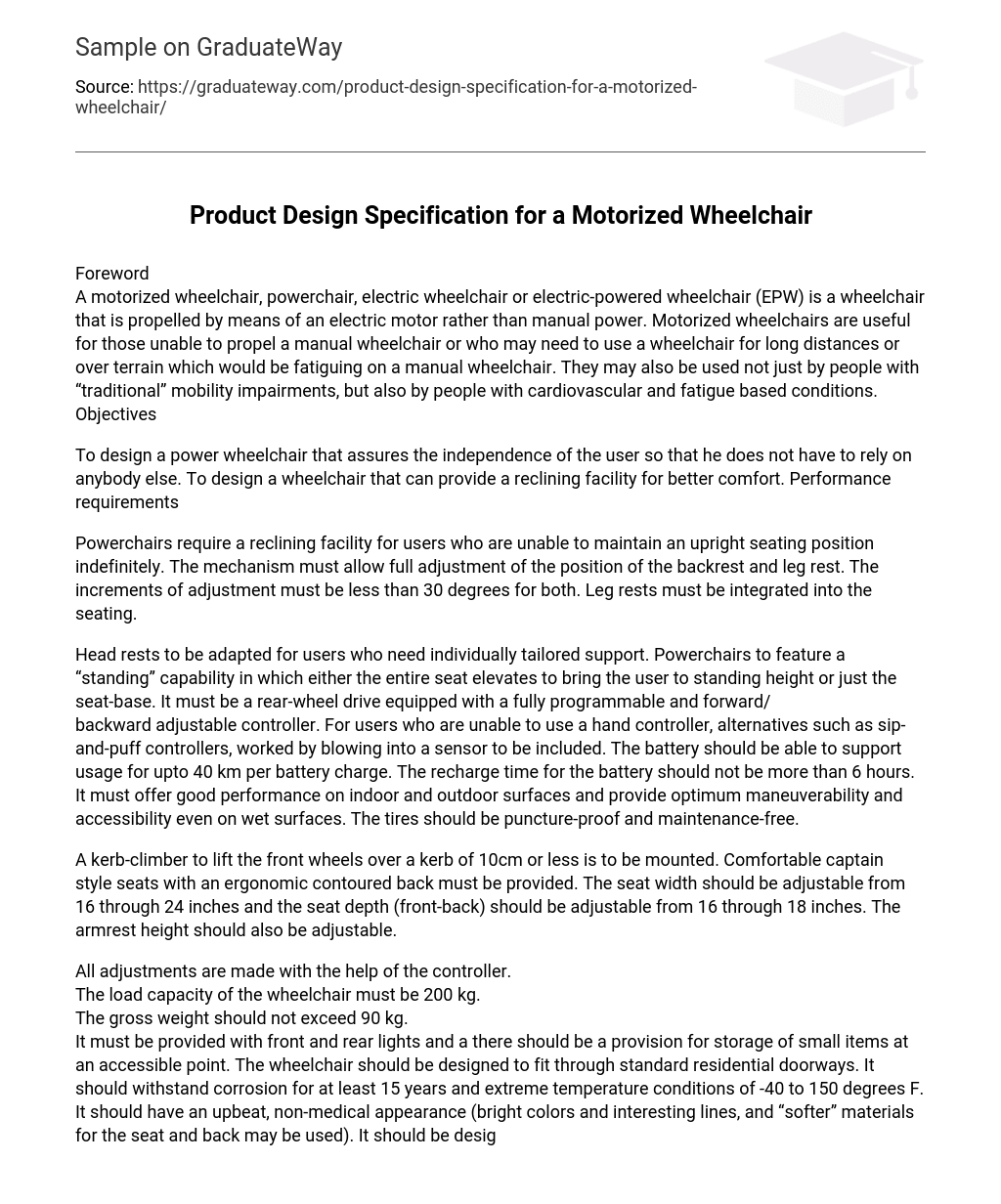Foreword
A motorized wheelchair, powerchair, electric wheelchair or electric-powered wheelchair (EPW) is a wheelchair that is propelled by means of an electric motor rather than manual power. Motorized wheelchairs are useful for those unable to propel a manual wheelchair or who may need to use a wheelchair for long distances or over terrain which would be fatiguing on a manual wheelchair. They may also be used not just by people with “traditional” mobility impairments, but also by people with cardiovascular and fatigue based conditions. Objectives
To design a power wheelchair that assures the independence of the user so that he does not have to rely on anybody else. To design a wheelchair that can provide a reclining facility for better comfort. Performance requirements
Powerchairs require a reclining facility for users who are unable to maintain an upright seating position indefinitely. The mechanism must allow full adjustment of the position of the backrest and leg rest. The increments of adjustment must be less than 30 degrees for both. Leg rests must be integrated into the seating.
Head rests to be adapted for users who need individually tailored support. Powerchairs to feature a “standing” capability in which either the entire seat elevates to bring the user to standing height or just the seat-base. It must be a rear-wheel drive equipped with a fully programmable and forward/
backward adjustable controller. For users who are unable to use a hand controller, alternatives such as sip-and-puff controllers, worked by blowing into a sensor to be included. The battery should be able to support usage for upto 40 km per battery charge. The recharge time for the battery should not be more than 6 hours. It must offer good performance on indoor and outdoor surfaces and provide optimum maneuverability and accessibility even on wet surfaces. The tires should be puncture-proof and maintenance-free.
A kerb-climber to lift the front wheels over a kerb of 10cm or less is to be mounted. Comfortable captain style seats with an ergonomic contoured back must be provided. The seat width should be adjustable from 16 through 24 inches and the seat depth (front-back) should be adjustable from 16 through 18 inches. The armrest height should also be adjustable.
All adjustments are made with the help of the controller.
The load capacity of the wheelchair must be 200 kg.
The gross weight should not exceed 90 kg.
It must be provided with front and rear lights and a there should be a provision for storage of small items at an accessible point. The wheelchair should be designed to fit through standard residential doorways. It should withstand corrosion for at least 15 years and extreme temperature conditions of -40 to 150 degrees F. It should have an upbeat, non-medical appearance (bright colors and interesting lines, and “softer” materials for the seat and back may be used). It should be designed for daily (not intermittent) use.
Customers should find the chair comfortable for a long period of time (12-14 hours). Ex-works cost of the product should not exceed 2 lakhs.
The target population is to be restricted to disabled people above 15 years of age. The desired life in service is 7 years for the seat and 20 years for the frame. Manufacture requirements
The product is to be manufactured and finished in-house.
Padded or mesh fabrics are to be used for the seat and leg rests for better comfort. Any material can be used for the frame as long as they comply with other statements in the specification. However, all parts should be latex
free.
All workmanship must be in accordance with the best commercial practices and the materials and components shall be new and free from defects. Sales volume will be 50/month for the first year, with increase in subsequent years. Acceptance standards
Every mechanism should be inspected prior to assembly.
Product must comply with ISO standards which include wheelchair testing standards, which are directly related to wheelchair design and production. According to the Extended ISO or EISO standards, the chairs must be subjected to more appropriate measures of the forces that a wheelchair is likely to be subjected to by an active user in the rougher rural and urban conditions to ensure quality. The safety standards of the wheelchair must conform to ANSI/RESNA wheelchair standards. Wheelchairs should meet basic standards of strength, durability and functionality. It must be a unique design and there should be no patent infringement. Disposal
As far as possible the materials used should be recyclable.
The product should not contain any hazardous materials.
Operation requirements
The installation should be a quick, tool-free adjustment of the features available to make the user comfortable on the chair. An operation and maintenance manual must be supplied.
Maintenance should be easy and hassle-free.
Since the powerchair is to be operated by the user (mostly disabled), it should be designed such that the user has no difficulty in controlling it or accessing any feature without any help from others i.e. the user should not depend on anyone to operate the wheelchair. The electric motors of the powerchairs will be powered by 4 or 5 amp deep-cycle rechargeable batteries. Dry-cell batteries are preferred for use. Powerchairs must carry an on-board charger which can be plugged into a standard wall outlet. Measures should be taken to assure the maximum safety of the user in case of mechanical, thermal or electrical hazards.





